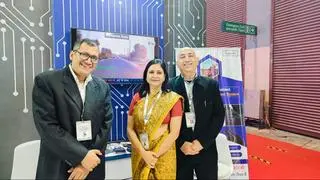“We both believed that agriculture entrepreneurship is going to become a huge sector and that it desperately needed capital, because traditional venture capital funds ignored it,” says Mark Kahn, Founding Partner, Omnivore Partners, a venture capital firm that invests in ventures that come up with breakthrough technologies for food, agriculture and rural economy sectors. “We saw this as an opportunity and decided to raise a fund,” he explains, as to why Omnivore Partners came into being.
Jinesh Shah, Founding Partner, adds that they believed agriculture was going through interesting times, thanks to a growing population with changed dietary habits – from a grain-based one to a protein-based diet. They also believed that this shift will last for a couple of generations and decided to focus on agriculture and food sectors.
The two launched their fund raising activities in late 2011 and raised ₹260 crore for the first fund all from domestic investors – a mix of strategic investors, financial institutions, family offices and wealthy individuals. “When we saw our venture capital peers only focussed on urban India, we saw this gap and we found the firm to address that gap,” explains Mark, a graduate from the University of Pennsylvania and an MBA from Harvard, who had worked in Godrej Agrovet before founding Omnivore with Jinesh. Omnivore has 12 active investments and invests in three areas – agriculture technology, innovative food and rural livelihoods. “We are typically seed and Series A investors and then we have follow on for Series B,” says Mark.
Global impact seenOmnivore invests ₹3-14 crore in a venture and picks up stakes in the 20 per cent plus range.
Omnivore believes that Indian innovation and engineering in the space of smallholder agriculture can have a global impact. “Technologies from India can go to smallholder farmers around the world; small holder farmers represent half of the farmers in the world. We are seeing that with our portfolio companies which are essentially making in India for the world,” says Mark.
Jinesh, a commerce graduate from Poddar College, Mumbai, and a chartered accountant and an MBA from Jamnalal Bajaj Institute, worked in corporate finance functions in various companies and was at venture capital firm Nexus Venture Partners, before starting Omnivore. He says India has the right ecosystem for start-ups in the agri-tech space. It is known for its frugal engineering solutions. Large global agricultural companies are present in India. “The problems that Indian farmers face are similar to what farmers face in Africa, South East Asia. When we make technological solutions at the price points for Indian farmers, they can be extended to a lot of other people,” he adds. The focus, says Mark, is still the Indian farmer, but “we see exports happening as well.”
“We are targeting net rupee returns of 25 per cent,” says Mark, adding that there is a misconception about the agriculture sector. “People look at agri GDP and say it is not growing fast. But look at Mahindra, Godrej Agrovet, Jain Irrigation, Mahyco, Rallis… India may have small farmers, but they have big agri businesses and those businesses have done incredibly well,” he adds.
With 80-90 per cent of the first fund fully deployed and the balance kept aside for follow on investments, Omnivore has started working on raising a second fund, of ₹600 crore, from both domestic and foreign investors. Omnivore will continue to remain focussed on the three sectors, but will write bigger cheques and invest in more ventures.
Investment climateMark says they are seeing 10 times the number of deals now than when they started. This is the golden age of entrepreneurship. More young, well educated people with good pedigree, who have professional experience are becoming entrepreneurs. The number of people interested in agriculture, food and rural economy has surged. Large VCs are looking at agriculture and food, which is good for the sectors as they are desperate for capital.
Why the name Omnivore? Mark, who is an “immigrant and not an expat,” says the idea came from a book titled The Omnivore’s Dilemma by Michael Pollan. But, he jokes, “Jinesh is a herbivore and I am a carnivore. So, we became Omnivore.” “The Jew and the Gujju,” Mark adds, for good measure.








Comments
Comments have to be in English, and in full sentences. They cannot be abusive or personal. Please abide by our community guidelines for posting your comments.
We have migrated to a new commenting platform. If you are already a registered user of TheHindu Businessline and logged in, you may continue to engage with our articles. If you do not have an account please register and login to post comments. Users can access their older comments by logging into their accounts on Vuukle.